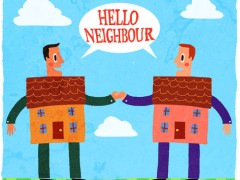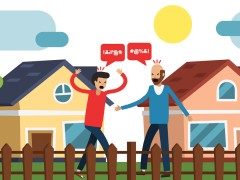still [stil] adv. 还,仍旧
* * *
A: You know our company is a newly-built one. Things will go better with development.
B: Maybe. Thank you for your help, but I still want to leave the company to seek development.
A:你知道我们公司刚成立不久,所有事情都会随着发展而好起来的。
B:也许吧。谢谢您的关照,但我还是想离开公司另谋发展。
* * *
move [muːv] v. 搬家
【派】movement 动作
【扩】removal 搬迁
【搭】move in 搬进 move out 搬出
* * *
A: I really wouldn't want to move.
B: But we have to do so this time.
A:我实在不愿意搬家。
B:但这次我们必须这么做。
* * *
miss [mis] v. 想念,思念
* * *
A: I know how you miss your mother.
B: Yes, I have left my hometown for a year.
A:我了解你多么地想念你的母亲。
B:是的,我已经离开我的家乡一年了。
* * *
neighbor [ˈneibə] n. 邻居
【派】neighborhood 邻里关系
【扩】kith 邻居 vicinage 近邻
* * *
A: How are you getting along with your neighbor?
B: We get along with each other very well.
A:你和你的邻居相处得怎么样?
B:我们相处得非常好。
* * *
person [ˈpəːsn] n. 人
【派】personal 个人的 personality 个性
【搭】in person 亲自
* * *
A: You're a very important person at this party.
B: Oh, please don't make fun of me.
A:今晚的宴会你是贵宾。
B:哦,别嘲笑我了。
* * *
people [ˈpiːpl] n. 人们
* * *
A: I think people in the country are happier than people in the city.
B: Can you tell me why?
A:我认为乡下的人们比城市的人们更快乐。
B:能告诉我为什么吗?
* * *
poor [puə] adj. 可怜的
【扩】pitiful 可怜的
【搭】be poor at 在……方面差
* * *
A: Poor thing! He must be feeling awful now.
B: Is there anything we can do for him?
A:可怜的人儿!他现在一定很不好受。
B:我们能为他做点儿什么吗?
adverb [关系副词]还,依旧;仍然,还是(会或可能);尽管那样,尽管如此;更加,还要(用于表示强调);还有(更多);静止地,不动地 - Brian's toe is still badly swollen and he cannot put on his shoe.
adjective [原级]静止的,不动的;宁静的,寂静的;无风的;不含碳酸气的,不起泡的;(照片)静态的,(画面)定格的 - David had been dancing about like a child, but suddenly he stood still and looked at Brad.
noun [抽象名词](电影或录像的)定格画面,剧照;(制酒的)蒸馏器;静止,安静,平静 - Four deafening explosions shattered the stillness of the night air. 4
verb [vi. 不及物动词](使)静止,平静,安静;使(感情)减轻,使(感情)平息;蒸馏 - She spoke quietly to still the frightened child.
- He is still there.
- I still stay in Beijing.
- She still loves you.
verb [vi. 不及物动词](使)改变位置,(使)移动;搬家,调动;(使)改变观点(或做法);前进,进展;采取行动;使感动,打动;促使,驱使;更改(时间或日期);改变话题;走棋,移动棋子;(在会议或法庭上)提议;<非正式>快速行进;(商品)被销售,销售(商品);进行社交活动,交往;(使)改变状态(或观点、领域、活动);<非正式>离去;使(肠)排空 - He lay there, unable to move.
noun [抽象名词]措施,行动;移动,活动;转变,改变;一步棋,走棋;搬家,迁移;步骤;(运动或比赛中的)传递,转移 - The car was already on the move.
move to…
- She moved to Mars last year.
move into…
- He has moved into the new house.
noun [专属名词]小姐(未婚女子)、女士,年轻未婚女子 - an unmarried woman or girl, esp a schoolgirl
verb [vt. 及物动词]想念,未击中,不懂;未做,错过 - If you miss a chance or opportunity, you fail to take advantage of it.
noun [专属名词]邻居,邻人;邻近的人(或物);邻国;他人,世人 - My neighbour spies on me through a crack in the fence.
verb [vt. 及物动词](地方,物体)位于…的附近,邻接;住在邻近 - He wished to live in amity with his neighbour.
adjective [原级]邻居的,邻近的 - A neighbour sheltered the boy for seven days.
noun [专属名词]邻居,邻人;邻近的人(或物);邻国;他人,世人 - And he said unto him, "Who is my neighbor?"
verb [vt. 及物动词](地方,物体)位于…的附近,邻接;住在邻近 - I went to our next-door neighbor, Mr. Smith.
adjective [原级]邻居的,邻近的 - Do not defraud your neighbor or rob him.
noun [具体名词]人;自然人,法人;(用于不知其人是谁时)某人,家伙;(语法)人称;(用于复合词)从事…工作(或担任…职务)的人;人品,为人;身体,人身;喜爱(某事物)的人;(戏剧或故事中的)人物,角色;(基督教神学)(圣父、圣子、圣灵三位一体的)位;容貌,外表 - If you talk about someone as a person, you are considering them from the point of view of their real nature.
two persons
- We have two persons with that name. 我们这里有两位叫这个名儿的。
VIP - a very important person
noun [具体名词]人,人类;人们,大家(the people);平民,老百姓(the people);民族,种族(peoples);(具有共同品质、兴趣等的)人员,团体;与某人有联系的人们(one's people);<美,非正式>各位,诸位;<美>(审判中的)公诉人(the People) - People were talking animatedly.
verb [vi. 不及物动词]居住在,定居于;充满,充斥着(某种类型的人) - A thousand people were there.
A.谓语动词用复数
- We are one people, with one will. 我们是一个民族,拥有一个意志。
B.泛指人们
- People do not know the value of health till they lose it. 直到失去健康,人们才知道健康的可贵。
C.the+ people, 人 民
- My duty is to serve the people.
adjective [原级]贫穷的;可怜的,不幸的;(身体)虚弱的,衰弱的;不擅长的,不熟练的;劣质的,差的,次的;贫乏的;(数量、比率等)不理想的,不合理的 - Even the poor have their pride.







